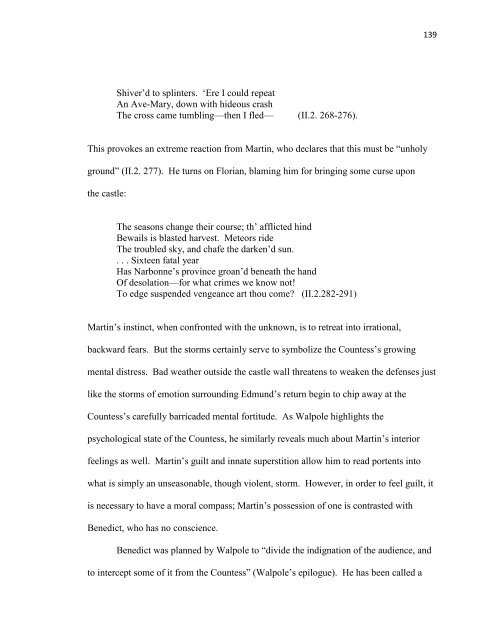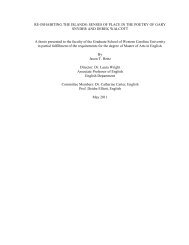SUMMERS, KAREN CRADY, Ph.D. Reading Incest - The University ...
SUMMERS, KAREN CRADY, Ph.D. Reading Incest - The University ...
SUMMERS, KAREN CRADY, Ph.D. Reading Incest - The University ...
You also want an ePaper? Increase the reach of your titles
YUMPU automatically turns print PDFs into web optimized ePapers that Google loves.
139<br />
Shiver’d to splinters. ‘Ere I could repeat<br />
An Ave-Mary, down with hideous crash<br />
<strong>The</strong> cross came tumbling—then I fled— (II.2. 268-276).<br />
This provokes an extreme reaction from Martin, who declares that this must be “unholy<br />
ground” (II.2. 277). He turns on Florian, blaming him for bringing some curse upon<br />
the castle:<br />
<strong>The</strong> seasons change their course; th’ afflicted hind<br />
Bewails is blasted harvest. Meteors ride<br />
<strong>The</strong> troubled sky, and chafe the darken’d sun.<br />
. . . Sixteen fatal year<br />
Has Narbonne’s province groan’d beneath the hand<br />
Of desolation—for what crimes we know not!<br />
To edge suspended vengeance art thou come? (II.2.282-291)<br />
Martin’s instinct, when confronted with the unknown, is to retreat into irrational,<br />
backward fears. But the storms certainly serve to symbolize the Countess’s growing<br />
mental distress. Bad weather outside the castle wall threatens to weaken the defenses just<br />
like the storms of emotion surrounding Edmund’s return begin to chip away at the<br />
Countess’s carefully barricaded mental fortitude. As Walpole highlights the<br />
psychological state of the Countess, he similarly reveals much about Martin’s interior<br />
feelings as well. Martin’s guilt and innate superstition allow him to read portents into<br />
what is simply an unseasonable, though violent, storm. However, in order to feel guilt, it<br />
is necessary to have a moral compass; Martin’s possession of one is contrasted with<br />
Benedict, who has no conscience.<br />
Benedict was planned by Walpole to “divide the indignation of the audience, and<br />
to intercept some of it from the Countess” (Walpole’s epilogue). He has been called a
















